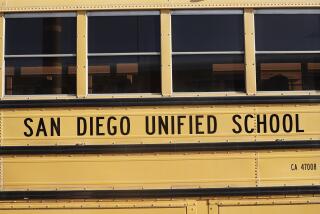Del Mar School District Cracks Down on Residency Cheats
The Del Mar school district has hired a detective and a lawyer in a get-tough effort to stop parents in outlying communities from sneaking their children into its classrooms.
This week alone, 30 to 50 out-of-district parents tried to register their children, officials say, and, although some requested interdistrict transfers, others falsified their addresses to make it seem the students that actually live in the district.
“Yesterday, somebody gave us three addresses and hoped one of them would hit,” Supt. Rob Harriman said Friday. “It’s not really amusing.”
Although the Del Mar Union School District is small--1,002 students and two elementary schools--Harriman said a hard-line approach is necessary to keep non-local pupils from making classes too big for teachers to handle.
“I know it sounds really hokey, but we’re trying to protect education,” Harriman said, adding that “teachers can’t teach kids when there are 40 in the classroom.” District policy calls for an average of 27 pupils per class.
With the school board’s support, Harriman hired a detective and a lawyer to make sure parents live in the district. When the address doesn’t check out, the district will bar the children from class.
“We’re playing hardball,” said Harriman, who has been superintendent since 1985 and believes he is backed by teachers, administrators and parents.
“We’re under an obligation to provide quality education,” said Stuart Seaward, principal of Del Mar Heights Elementary.
He sees little choice but to take stern measures to keep intruders from the district. “Like it or not,” he said, “that’s the reality of the situation. You’ve got to be pragmatic.”
Dwight Worden, the private attorney hired by the district, is sending notices to parents suspected of falsely claiming Del Mar residency.
The notices demand proof of residency and advise that, without such evidence, “your children will be denied access to school.”
Harriman said the district has found a method of identifying parents who have lied through means such as phony leases. “We have a way of checking it, but I prefer not to have it in the paper,” he said.
Worden was unavailable for comment Friday.
If the attorney’s notices don’t succeed, a detective will follow up in cases where there is lingering doubt about residency. Sometimes, for example, parents are tripped up when mail sent to bogus addresses is returned to district offices, Harriman said.
He estimates it will cost the district $1,000 for these initial attorney and detective services.
The problem of outsiders seeking admission “is very common in most districts, it’s just that we’re not going to allow it,” Harriman said.
Del Mar flatly denies requests for interdistrict transfers, but that doesn’t stop some parents from attempting other methods, such as the parents who gave three local addresses, all false.
Sometimes out-of-district parents want their children in Del Mar simply because an individual school is closer to their homes, but in other cases the status and reputation of Del Mar are the attractions.
“Certainly we are recognized as a quality district,” Seaward said.
More to Read
Sign up for Essential California
The most important California stories and recommendations in your inbox every morning.
You may occasionally receive promotional content from the Los Angeles Times.










